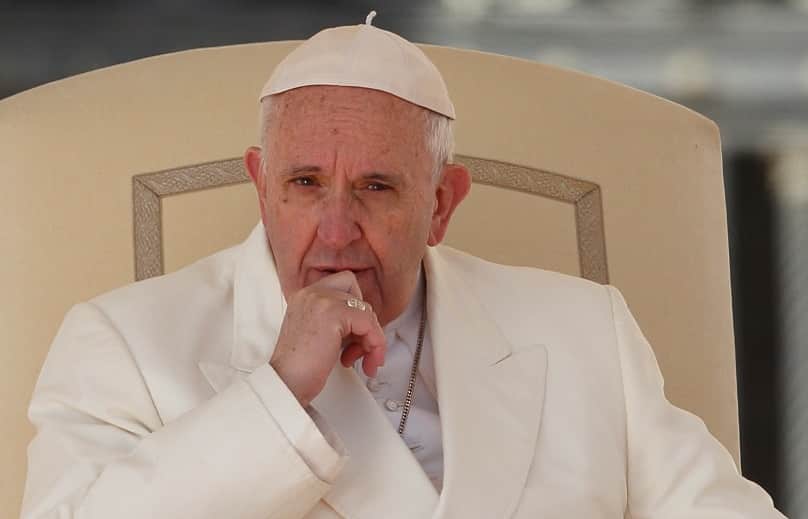
There’s this odd dichotomy that exists among various sectors of those who associate themselves with the Catholic Faith relating to the interpretation of aspects of the post-Synodal Apostolic Exhortation, Amoris Laetitia. Let’s call it “The Pope Francis Enigma”. On one side we have those who scrutinise (with a fine tooth-comb, I might add) and question every single word and action the Holy Father engages in, and on the other we have those who would seek to use every single word and action of the Holy Father as licence to permit and expand their own agenda, even if this means acting contrary to or disregarding (completely or selectively) the doctrines of the Catholic Faith that have been handed down from the apostles.
Even though similar disputes have existed in the Church from her earliest days, something seems to be seriously lacking from both polar ends of this debate, and that something is context. Since when has any papal document been released and, as a result, intended to be exclusively open to interpretation in whatever way the reader saw fit? Does not the doctrine of the Church matter in this discussion? As well as Scripture, Tradition, Canon Law and Church Teaching? How can a papal document be divisible from all those aspects that enrich the Church and have been her foundation throughout the past two millennia? Think about it: why would we read a papal document apart from, and separate to, all of the teaching, doctrine and tradition of our rich faith? I believe this very issue is at the heart of the misunderstandings that surround Amoris Laetitia and Pope Francis.
What is context, you might ask? Oxford Dictionaries Online defines context as “the circumstances that form the setting for an event, statement, or idea, and in terms of which it can be fully understood.” The word originates from the Latin ‘contextus’ meaning “that which is woven together”.
One thing that needs to be understood by both ‘sides’ of the debate is this: Pope Francis has not deviated from Church teaching on the Eucharist nor on the reception of the Blessed Sacrament by those who are divorced and remarried. Amoris Laetitia is abundant with quotations taken from Pope Francis’s two predecessors – St John Paul II and Benedict XVI – upholding and reaffirming the Church’s teachings on Holy Communion and the proper spiritual disposition required of the faithful to receive the Eucharist, especially as it pertains to the divorced and remarried.
In an interview with the Italian magazine Il Timone earlier this year, Cardinal Gerhard Müller, prefect of the Congregation for the Doctrine of the Faith, reaffirmed the indispensable nature of this doctrine as “an essential element of Christian moral theology and the theology of the sacraments.” What this means is that no one, not even the Pope, can dispense from this teaching and permit those living in grave sin to receive Holy Communion. Cardinal Müller rightly pointed out, “the confusion on this point also concerns the failure to accept the encyclical Veritatis Splendor.” And might I point out, a failure to also accept the teachings of Familiaris Consortio (1981).
This is where context comes into effect and it is something that many should heed, if they have not already done so. Cardinal Müller stated in the interview: “Amoris Laetitia must clearly be interpreted in the light of the whole doctrine of the Church.” It is downright misguided, wrong and prideful, for that matter, to read and interpret Amoris Laetitia solely according to one’s own way of understanding the Pope’s teaching, and exclude the perennial and definitive teaching of the Church in its entirety.
Perhaps we need to read Amoris Laetitia in terms of Pope Francis seeking to unite fragments of a broken and sinful world together, on a journey with others to reach the goal of a return to full communion with the Church. Perhaps Pope Francis is asking us to look to our own lives and to ask ourselves: how can we journey with others to assist them to better understand God’s plan for humanity and the Church?; how can we catechise those in irregular situations to understand God’s plan for marriage and sexuality?; how can we look beyond ourselves to the sufferings of others and meet them right there in the field-hospital of the Church? This is what Pope Francis is speaking of when he writes of “accompaniment” – walking with others along a gradual journey toward a goal, their own “call to conversion”.
Is it possible for us to unite as one Church, under the Vicar of Christ who has been elected by the College of Cardinals under the guidance of the Holy Spirit? This one truth cannot be denied, and we would do well to remember this next time any of us decide to misrepresent our beloved Holy Father in such a way as to claim our own opinions or interpretations of him as objective truth.
If all of these aspects of the Church were taken together and considered in light of Amoris Laetitia, perhaps the Christian Faithful would read the apostolic exhortation and see Pope Francis, for that matter, in an entirely new light.
Hyperlinks added by The Catholic Weekly.
